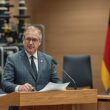The German government coalition appears to be navigating a delicate path regarding the future of compulsory military service, with Chancellor’s Office Minister Thorsten Frei expressing cautious optimism about reaching an agreement. While publicly presenting a united front, underlying tensions persist between the Social Democrats (SPD) and the Christian Democratic Union (CDU) concerning the potential recourse to conscription should voluntary recruitment fail to meet the Bundeswehr’s growing personnel needs.
Frei’s recent comments to the “Rheinische Post” emphasize the shared objective of bolstering the armed forces’ manpower, underscoring the urgency dictated by the “tense security policy situation”. However, the statement also subtly highlights the immense pressure facing Defense Minister Boris Pistorius, who is tasked with overhauling the Bundeswehr across personnel, equipment and infrastructure to fulfill existing commitments, all while maintaining critical military aid to Ukraine.
The current impasse hinges on the specific mechanisms to be implemented if the desired number of volunteers doesn’t materialize. This suggests that a consensus on whether to reinstate aspects of mandatory service remains elusive, despite the stated common goal. Critics argue that the lack of clarity reflects a broader political hesitancy to fully commit to a significant shift in national security policy, compounded by the ongoing demands placed on the country’s resources.
The situation exposes a fundamental challenge: how to balance the imperative of strengthening the Bundeswehr with the political sensitivities surrounding compulsory military service in a nation increasingly reliant on voluntary participation. The swift resolution championed by Frei, while desirable, risks glossing over the complex political maneuvering and potential compromises required to ensure a sustainable and effective defense strategy for Germany.





